

Third place. The barber shop is an example of the third place; in many societies it has been a traditional area for (especially) men to congregate separate from work or home.
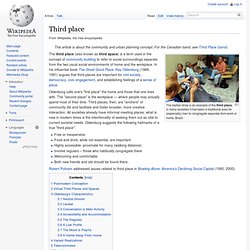
Brazil. Oldenburg calls one's "first place" the home and those that one lives with. The "second place" is the workplace — where people may actually spend most of their time. Third places, then, are "anchors" of community life and facilitate and foster broader, more creative interaction. All societies already have informal meeting places; what is new in modern times is the intentionality of seeking them out as vital to current societal needs.
Free or inexpensiveFood and drink, while not essential, are importantHighly accessible: proximate for many (walking distance)Involve regulars – those who habitually congregate thereWelcoming and comfortableBoth new friends and old should be found there. Robert Putnam addressed issues related to third place in Bowling Alone: America's Declining Social Capital (1995, 2000). Homi K. The Freedom of Expression Project. Challenges and opportunities for freedom of expression in the networked environment Second Generation mobile phone standards that include limited data capabilities, for example for the sending of text messages (SMS or short message service) Third Generation mobile phone standards that allow for higher data transmission speeds, facilitating broadband internet access access to knowledge A movement aiming to improve access across the world to: human knowledge; information; goods whose production is dependent on scientific or technical knowledge (e.g. drugs, electronic hardware); and the tools to produce them.
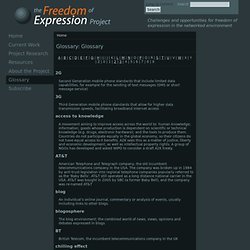
Countries do not participate equally in the global economy, so their citizens do not have equal access to it benefits. American Telephone and Telegraph company, the old incumbent telecommunications company in the USA. Blog An individual’s online journal, commentary or analysis of events, usually including links to other blogs. blogosphere chilling effect citizen journalism citizen media. Towards Place-peer community and civic bandwidth: a case study in community wireless networking. Cho.hanna@gmail.com Abstract This article presents findings from an ethnographic case study of one Urban Community Wireless Networking (CWN) group, Wireless Toronto.
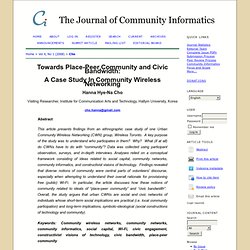
A key purpose of the study was to understand who participates in them? Why? What (if at all) do CWNs have to do with “community”? Keywords: Community wireless networks, community networks, community informatics, social capital, Wi-Fi, civic engagement, constructivist visions of technology, civic bandwidth, place-peer community Introduction Bandwidth. At the heart of this explanation, there seems to be a kind of technological utopianism, reminiscent of the wildly optimistic first decade of the Internet.
A closer look at this group of volunteers reveals a group of diverse individuals, who – while appreciating the opportunity for camaraderie based on a shared interest in wireless networking technology – are brought together by more than an interest in socializing or learning. About Personal Democracy Media. Welcome | Manifesto | Staff | Contact Us | Disclosures Welcome Technology and the Internet are changing democracy in America.
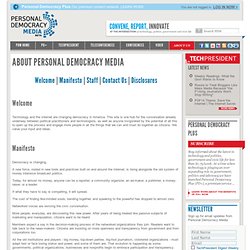
This site is one hub for the conversation already underway between political practitioners and technologists, as well as anyone invigorated by the potential of all this to open up the process and engage more people in all the things that we can and must do together as citizens. We value your input and ideas. Manifesto Democracy is changing. A new force, rooted in new tools and practices built on and around the Internet, is rising alongside the old system of money intensive broadcast politics. E-conservation magazine - Building Bridges in the Third Place. Corporations were quick to realize the importance of selling a “third place experience” [7], and museums have unsurprisingly not been far behind.
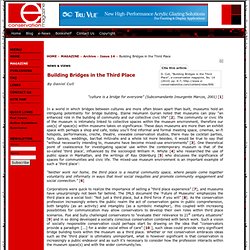
The IMLS document the ‘Future of Museums’ emphasizes the third place as a social tool: “Not just a third place, but a third force if you will” [8]. As the conservation profession increasingly enters the public realm the act of conservation gains in public comprehension, both tangibly (as an activity) and intangibly (as a symbolic metaphor), this coupled with increasing possibilities for communication may allow conservators to develop their own roles within third place scenarios. Pye and Sully challenged conservators to "evaluate their relevance to 21st century situations" [9] and in so doing developed a socially conscious conservation combined with bench work. Notes [1] Marcos, Subcomandante Insurgente, Paths of Dignity: Indigenous Rights, Memory and Cultural Heritage, accessed March 12, 2001, URL:
3 Keys To Creating Great "Good Places" In his book, The Great Good Place, the urban sociologist Ray Oldenburg wrote about the importance of third places--the informal “public places on neutral ground where people can gather and interact.”
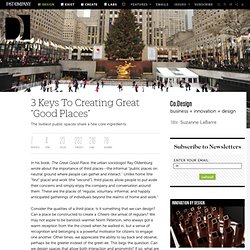
Unlike home (the “first” place) and work (the “second”), third places allow people to put aside their concerns and simply enjoy the company and conversation around them. These are the places of “regular, voluntary, informal, and happily anticipated gatherings of individuals beyond the realms of home and work.” 5 Best Free WIFI Locations in Coral Gables. When Ray Oldenburg coined the term “third place“ back in the late 80′s, little did he know that free wireless internet connections would play such an important role in creating the anchors of community life he argued were essential for civil society, democracy, civic engagement and establishing feelings of a sense of place.

If you’re anything like me, you have an office, a home office and a number of third places you can count on to get some work done. There are days that the office gets too loud and the home office gets too quiet. On days like these, finding a third place that provides an alternative can be the key to a productive workday. Computer-mediated communication as a virtual third place: building Oldenburg’s great good places on the world wide web.